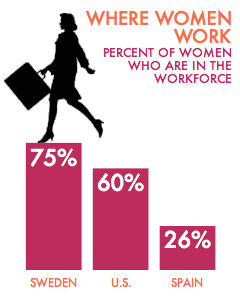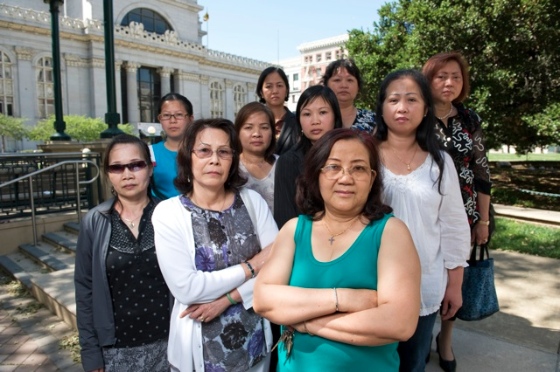
April 13, 2012 |
Reproductive Justice: What Does “Choice” Really Mean
Reproductive justice goes beyond bodies and incorporates notions of history, community, and intersectionality.

For a commonplace activity that’s been going on for millennia, reproduction is surprisingly newsworthy these days. A contentious presidential election cycle has thrust the issue of reproductive rights into stump speeches and debates; disputes over health insurance coverage for contraception has bishops crying foul; and a now-reversed decision by the breast cancer organization Susan G. Komen for the Cure to withdraw funding for Planned Parenthood galvanized many of the 98% of Americans who use contraception at some point in their lives.
But in communities of color, exercising one’s reproductive rights means more than the discrete act of visiting a clinic. Non-profit organizations organization around “reproductive justice” use reproductive choice as a lens through which to view a wide range of social justice issues. As Loretta Ross, a longtime reproductive justice activist and National Coordinator of the SisterSong Women of Color Reproductive Justice Collective, has written, the founders of the reproductive justice movement bypassed “the language of choice because they represented communities with few real choices.”
Dorothy E. Roberts, a law professor at Northwestern University and author of “Killing the Black Body: Race, Reproduction, and The Meaning of Liberty,” attributes this to the historical disempowerment – the reproductive injustice – experienced by women of color with respect to exercising autonomy over their own bodies, particularly in the context of American slavery. Slave women were used for breeding more slaves, especially after the transatlantic trade was banned.
Since then, she said, a long, continuous line of history of policies and rhetoric have continued to paint black women as “irresponsible reproducers” who can’t be trusted to choose what is best for themselves and their families. For example, North Carolina continued to forcibly sterilize many poor African-Americans through the mid-1970s. In the 1990s, Roberts said, long-term forms of birth control such as hormonal implants were widely distributed in Black communities.
“These are deeply embedded stereotypes that hinge on black women’s inability to make reproductive decisions and care properly for their children,” she said.
Little wonder, then, that many black women still harbor distrust of the medical system, an attitude that Eleanor Hinton Hoytt, President and CEO of the Washington, D.C.-based Black Women’s Health Imperative, says is a major factor in Black women’s disproportionately poor health outcomes. Black women account for 66% of new HIV/AIDS diagnoses in the U.S., and are more likely to die from cervical cancer than their white or Latina counterparts. Last year, an Amnesty International report found that Black women are nearly four times more likely to die of pregnancy-related complications than white women.
In roundtables and surveys conducted by the Imperative, their constituents have repeatedly complained of sub-standard care: they were not presented with a full range of treatment options, or felt they were “steered” toward a particular contraceptive product or medical procedure. Several said they were actually refused treatment by doctors because they are overweight or obese.
“There is a continuing distrust and mistrust of the health care system as well as healthcare providers,” said Hinton Hoytt. “Black women do not feel the healthcare system is respectful of who they are. It does not respect their bodies, and it does not empower them to be informed, healthier consumers.”
To counter that distrust, the Imperative works with sister organizations in Atlanta and Chicago to address issues like disparities in breast and cervical cancer outcomes. They partner with health centers and community centers to raise awareness, and also advocate for policy changes, such as a requirement that doctors notify a woman if she has dense breast tissue, which can make it difficult to detect tumors with normal mammograms. Young black women, she said, are particularly under-diagnosed, often because they are not offered the more technologically advanced kinds of screening that can penetrate their breast tissue.
For Latina women, language and immigration status impede access to care, particularly over the last few years, said Laura Jimenez, Executive Director of California Latinas for Reproductive Justice.
“A stepped-up focus on immigration issues has compounded people’s fears of accessing services, particularly for young women, women who are undocumented, and older women, who already face significant barriers in accessing care,” she said.
According to research by the U.S. Centers for Disease Control and Prevention, Hispanics are twice as likely as blacks and three times as likely as whites to lack a regular health care provider.
“So many people are uninsured completely -- what is their access to basic health care, let alone reproductive health care?” she said.
Jessica Gonzalez Rojas, the Executive Director of the National Latina Institute for Reproductive Health, said the fragmented nature of the U.S. healthcare system was another factor that left Latina women vulnerable to diseases like cervical cancer, of which they have the highest rates of any ethnic group.
“We chalk this up to the fact that Latinos overall have the highest uninsured rate, and it’s extremely challenging to navigate an extremely complicated, patchwork healthcare system in order to get a Pap smear and the screening necessary to catch the cancer before it advances,” she said.
Her group fights to protect funding for the federal and state programs that serve low-income and undocumented women, through a network of affiliates around the country who they train and mobilize at critical moments. In January of this year, colleagues in Texas organized a campaign to send a thousand postcards to the Department of Health and Human Services protesting the “religious freedom” exemption to contraceptive coverage.
Gonzalez Rojas said it’s particularly important for Latina women to be vocal about their access to reproductive care, and her group has placed op-eds in several Spanish-language outlets this election cycle.
“There’s this myth that Hispanics are conservative, they’re Catholic, they don’t use birth control, they don’t have abortions, but that’s absolutely not true,” she said. “It’s an unspoken truth in our community, so we’re trying to lift up these voices around these issues.”
Eveline Shen, Executive Director of the Oakland-based non-profit Asian Communities for Reproductive Justice, points out that the community-based nature of reproductive justice work allows them to respond to their constituents’ needs in a way that larger service providers can’t.
In the Asian immigrant community in California, for example, occupational hazards can be a major obstacle to reproductive health. Many women support their families through work at nail salons, which requires little training or language skills, but which exposes them over time to dangerous chemicals used in nail products. Working with employees at California nail salons, ACRJ produced a toolkit with information on how long-term exposure to toxic chemicals can damage their reproductive and physical health, and what steps they could take to limit their exposure.
“When you look at what are the most pressing and relevant reproductive health issues in our community – Planned Parenthood provides valuable services, but they’re not accountable to our base,” she said.
Although reproductive justice groups often target specific communities and their needs, they work with a variety of other groups in coalitions around issues that affect a range of groups. Shen described one of ACRJ’s first undertakings a decade ago, the shutting down of a medical waste incinerator in East Oakland whose fumes were threatening the health of many members of their community.
“It was spewing dioxin, which was a very toxic reproductive health toxin, so we worked as part of an environmental justice collaborative,” she said. ACRJ is currently building a nationwide initiative around the issue of “strong families,” which encompasses a broad range of policy issues.
Denicia Cadena, a community organizer with Young Women United in Albuquerque stressed the intersectionality at the heart of the reproductive justice movement.
“You can’t say, ‘Oh, this issue affects my woman self,’ or ‘This affects my Chicana self,’” she said.
“It’s about that real intersectionality. And just like you can’t parcel out our identities, these women’s health issues can’t be parceled out either. The environment, the media, contraception – all of these things are important, because all of these things affect our community.”